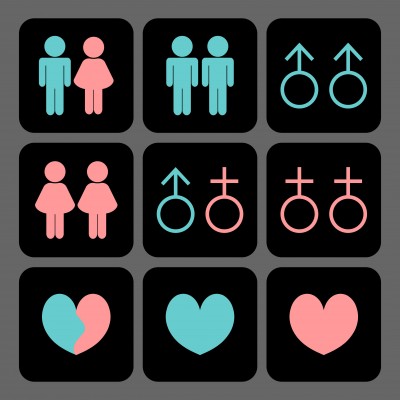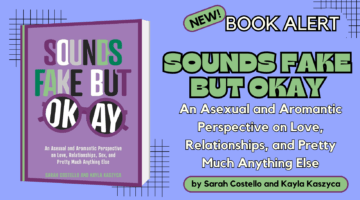Men’s And Women’s Attitudes Toward Male And Female Bisexuals
August 7, 2013 by Justin Lehmiller

Over the past two decades, psychologists have devoted significant research attention to understanding the origin and nature of prejudice against gays and lesbians. At the same time, prejudice against bisexuals has been largely overlooked. What little research exists on this topic suggests that bisexuals are typically viewed negatively—and, not only that, but in national U.S. survey data, bisexuals are actually viewed less favorably than persons who are exclusively gay [1]. So where does this negativity come from? And do people feel differently about male vs. female bisexuals? A new study published in the Archives of Sexual Behavior yields some answers to these questions.
In this study, 164 women and 89 men completed a survey about their attitudes toward bisexual individuals [2]. All participants were heterosexual, and most were young (average age of 19.5) and White. Participants completed measures of prejudice against bisexual men and women, as well as a measure of how erotic they think female same-sex behavior is (the authors believed that heterosexual men’s attitudes toward female bisexuals might be related to how turned on they are by the thought of two women together). In addition, participants were asked to describe in their own words the first thing that comes to mind when thinking about a bisexual woman and, separately, when thinking about a bisexual man.
Overall, levels of prejudice against bisexuals were relatively low (average prejudice scores were about 2 on a scale ranging from 1 to 6); however, this is not particularly surprising given the young age of this sample. A large number of studies have found that young adults are far more accepting of sexual minorities than older adults. That said, female participants reported even lower levels of prejudice than did male participants. In addition, whereas women’s attitudes toward male and female bisexuals did not differ, men reported significantly higher levels of prejudice toward male bisexuals than toward female bisexuals. Why is that? Men tended to see female same-sex behavior as highly erotic, and statistical analyses revealed that this eroticization of lesbian sex at least partially explained why men held more favorable attitudes toward female bisexuals than toward male bisexuals.
Although average scores were low on measures of prejudice, negativity toward bisexuals (particularly male bisexuals) was evident on the open-ended response questions. When asked to describe the first thing that pops into their head when thinking of a bisexual man, 17% of participants stated that he was secretly gay (consistent with the popular stereotype that “bisexuality is just a layover on the way to gaytown”), 5% said he was disgusting or immoral, and another 5% said that he just wanted attention. Participants’ thoughts about female bisexuals were very different—only 2% said that she was secretly gay, 3% said she was disgusting or immoral, and 0% said that she just wanted attention. It is also worth noting that male participants expressed more negative thoughts about bisexuals (both men and women) than did female participants.
These results don’t give us a complete picture of attitudes toward bisexuality, given the limited demographic profile of this sample. However, beyond just replicating this study with a larger and more diverse sample, it would also be worthwhile to explore how gay men and lesbians feel about bisexuals because many bisexuals do not feel particularly accepted by the gay community (e.g., some gays and lesbians may view bisexuality as threatening because they think it suggests that sexual orientation is a choice).
In sum, these findings tell us that when considering attitudes toward bisexuals, it is important to look at attitudes toward male and female bisexuals separately, and also to consider the responses of male and female participants separately. Additionally, there appear to be multiple motives that can potentially underlie prejudice toward bisexuals, ranging from doubts about their authenticity to morality concerns.
Want to learn more about Sex and Psychology? Click here for more from the blog or here to listen to the podcast. Follow Sex and Psychology on Facebook, Twitter (@JustinLehmiller), or Reddit to receive updates. You can also follow Dr. Lehmiller on YouTube and Instagram.
[1] Herek, G. M. (2002). Heterosexuals’ attitudes toward bisexual men and women in the United States. Journal of Sex Research, 39, 264-274.
[2] Yost, M.R., & Thomas, G.D. (2012).Gender and binegativity: Men’s and women’s attitudes toward male and female bisexuals. Archives of Sexual Behavior, 41, 691-702.
Image Source: 123rf
You Might Also Like:

Dr. Justin Lehmiller
Founder & Owner of Sex and PsychologyDr. Justin Lehmiller is a social psychologist and Research Fellow at The Kinsey Institute. He runs the Sex and Psychology blog and podcast and is author of the popular book Tell Me What You Want. Dr. Lehmiller is an award-winning educator, and a prolific researcher who has published more than 50 academic works.
Read full bio >

